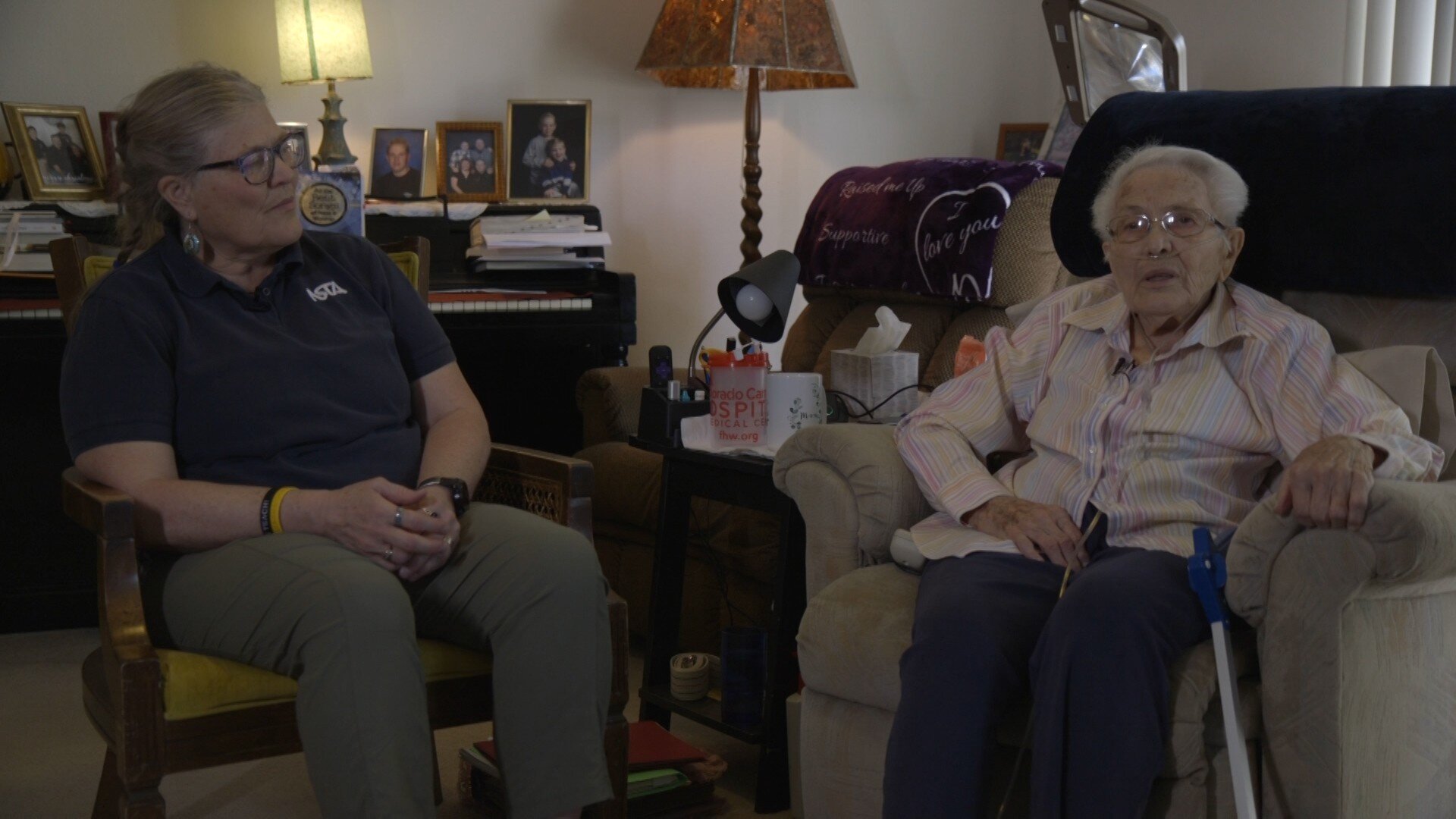'It just makes me proud': A family history shows the power of friendship, 100 years later

FRUITA, Colo. — The next house you walk into, you will likely find pictures of families in frames or in photo albums. That is a connection we all have in common. For many of us, family holds us together and, personally, starting a family has always been a dream of mine. I want to share stories and pass on keepsakes of all the people who are gone to my children.
Walking into Ruth Eva Caldwell-DeVore’s home in Fruita, Colorado was a reminder of how important it is to pass on family histories and stories. In her home, Caldwell-DeVore is surrounded by memorabilia and photos of her family in frames of many sizes on the walls, the shelves and on her piano. One piece especially stood out: a black and white photo of her mother, Hannah Blue, standing next to Mary Frances-Thompson, better known as Te Ata.
“I think it’s something that you hand down to your kids ... the good things in your life, so we see the good and not the bad that has happened,” said Caldwell-DeVore.
Te Ata, who passed away in 1995 at the age of 99, was an actress and citizen of the Chickasaw Nation. Blue traveled across the country with Te Ata as an accompanist on the piano and vocalist as part of the Chautauqua Circuit.
The story of these two women — one Native American and one white — was a connection through music that transcended race. The story is more powerful when you consider that about a century later, discrimination and racism against Native Americans is still an ongoing problem.
I remember when my wife first told me about her great aunt, Hannah Blue. However, she said Hannah Blue performed in a circus.
Hannah Blue did not travel with the circus; in fact, it was the Chautauqua Circuit. And while it may sound like a summer camp from an 80’s movie, Chautauqua is a word of various meaning that originates from the Erie Tribe, the first people of the land who spoke Iroquois. The Chautauqua Circuit started out in New York as a social gathering to educate the community with performances and talks by teachers, priests, scientists and musicians. The Chautauqua circuit was made up of 15 major agencies across the U.S.
Two different agencies sent Hannah Blue a letter to ask her to travel and perform with the Redpath-Horner Chautauqua Circuit.
“Mother [Hannah Blue] is the one who introduced her [Te Ata] to the stage and the singing,” Caldwell-DeVore recalled.
I met Caldwell-DeVore in January of 2022 when I took a road trip to Fruita with my wife and her father to spend the new year listening to Caldwell-DeVore's stories. She spoke of Hannah Blue and Te Ata’s travels with the Chautauqua Circuit in the 1920s and showed us the leather dress Hannah wore that Te Ata made for her. The dress was a favorite of Caldwell-DeVore's two daughters, Jackie and Beverly, as a costume to wear when they were growing up.

Beverly DeVore-Wedding remembers the stories Ruth would tell her about her grandmother Hannah Blue and Princess Te Ata. During this interview, it got her thinking about what it was like being a woman in the 1920’s. And how two women of such different background traveling together must have been frightening and exciting all at the same time. Their strong bond and friendship made them depend on each other and the pair continued to stay in touch by writing letters to each other until Blue’s death in 1973, DeVore-Wedding explained.
“It represents a part of my grandmother's life … leaving her family and probably taking the train and then going out and traveling in the Chautauqua ... I mean that's really gutsy … So, the whole Chautauqua story and that she was able to perform for lots of people and enrich their lives, it just makes me proud,” Beverly said.
America was in a period of dramatic change when Hannah Blue and Te Ata began traveling together: WWI had recently ended and women had just won their fight for the right to vote; four years later, Native Americans won citizenship.
Hannah Blue was in her early 30’s when she began touring with the group. When Blue played the piano for Te Ata, who she was familiar with because they were both from Oklahoma, she performed under the stage name Ziato.
“To me, Princess Te Ata was just special because of it all, and because mother [Hannah Blue] was an instrument in getting her [Te Ata] started I think… that's my connection with her… just knowing all of that," said Caldwell-DeVore.
Times have changed since the “roaring 20’s.” But in these 2020s, Native American People still face discrimination, there is an ongoing crisis of missing and murdered Indigenous people in the country, and Americans are being stripped of their rights.
By looking at the story of Hannah Blue and Te Ata, perhaps people can see the power of doing good by one another in this century, no matter our differences.
Bean Yazzie is a multimedia journalist at Rocky Mountain PBS. You can reach them at beanyazzie@rmpbs.org.
